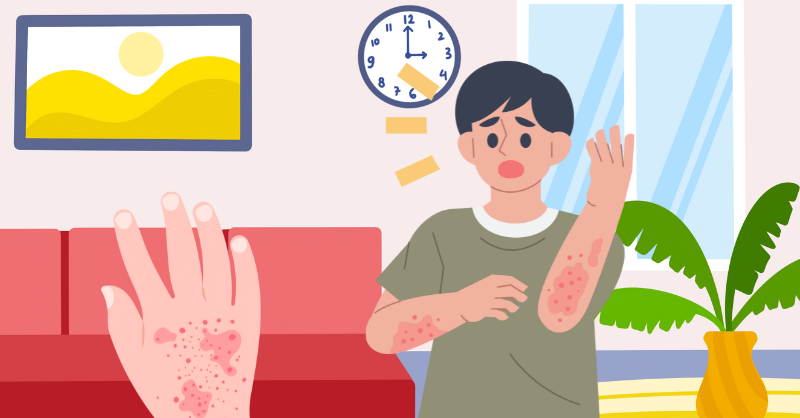Eczema, a term that encompasses a group of conditions characterized by itchy, inflamed, and often red skin, affects millions globally. This article delves into the various types of eczema, identifying triggers and exploring the latest advancements in treatments that offer relief and improve quality of life for sufferers.
Types and Triggers
Eczema is not a singular condition but a collection of ailments with varying symptoms and triggers. The most common form, atopic dermatitis, often occurs in individuals with a family history of the condition or other atopic diseases such as asthma or hay fever. Environmental factors like pollutants, allergens, and irritants can also provoke eczema flare-ups, making management a constant challenge. Triggers are highly individual, but common ones include harsh soaps, detergents, stress, and climate changes.
Latest Treatments
Recent years have seen significant advancements in eczema treatments, particularly in non-steroidal options that reduce dependency on corticosteroids. A notable development is the FDA approval of Zoryve (roflumilast) cream 0.15%, a new treatment for mild to moderate atopic dermatitis in adults and children over six years old. This once-daily, steroid-free cream promises efficacy with fewer side effects, marking a major step forward in eczema management. Everyday Health and Drugs.com provide detailed insights into the benefits of this new cream.
Holistic and Lifestyle Approaches
Beyond medications, managing eczema often requires a holistic approach that includes lifestyle adjustments to minimize exposure to known triggers. Moisturizing regularly with ointments like Vanicream, avoiding extreme temperatures, and using gentle skincare products are all effective strategies. Recent studies have also highlighted the potential of probiotics in managing eczema by altering the skin’s microbiome to reduce inflammation. News-Medical.net discusses an innovative probiotic treatment based on the findings from NIAID’s research.
Management of eczema also extends into dietary considerations. Research suggests that certain foods can exacerbate or alleviate eczema symptoms. Elimination diets, under the guidance of healthcare professionals, can help identify potential food triggers. Common culprits include dairy, eggs, soy, gluten, nuts, and shellfish. Adjusting one’s diet not only can help manage flare-ups but also contributes to overall skin health. Comprehensive guides and dietary tips for eczema sufferers are available on resources like WebMD.
Stress management is another crucial aspect of dealing with eczema, as stress is a known trigger for flare-ups. Techniques such as mindfulness meditation, yoga, and regular exercise can significantly reduce stress levels and, by extension, the severity of eczema symptoms. Engaging in these activities not only helps manage eczema but also enhances overall mental health and well-being. Resources for stress reduction techniques suitable for eczema patients are discussed in-depth on Mayo Clinic’s website.
Finally, ongoing support and education are vital for those living with eczema. Many find solace and practical advice through support groups and online communities where experiences and coping strategies are shared. Organizations like the National Eczema Association offer resources for connecting with others facing similar challenges, ensuring that no one has to manage eczema alone.
As the scientific community continues to deepen its understanding of eczema, new and innovative treatments are emerging. One promising area of research is biologic therapy, which targets specific parts of the immune system that contribute to inflammation and eczema symptoms. These biologic medications, such as dupilumab, have shown significant efficacy in reducing the severity and frequency of eczema flare-ups for those with moderate to severe conditions. Information on these advanced treatments can be found on medical websites like Healthline.
In addition to pharmaceutical advancements, there is also a growing trend towards integrating holistic and natural remedies into eczema management plans. Treatments such as coconut oil, oatmeal baths, and tea tree oil are being embraced by those seeking alternative or complementary options to traditional medications. While the effectiveness of these natural remedies can vary, many find them beneficial, especially when used in conjunction with medical treatments. Detailed reviews and recommendations for natural eczema treatments are available on DermNet NZ.
Lastly, the development of digital tools and apps designed to track skin conditions and treatment effectiveness has provided patients and healthcare providers with more precise data to tailor management strategies effectively. These digital resources can monitor flare-up triggers, treatment responses, and lifestyle factors, offering a personalized approach to managing eczema. Platforms that provide these digital solutions are often discussed on technology and health hybrid sites like Medgadget.
These comprehensive strategies underline the importance of a multi-faceted approach to eczema management, encompassing medical treatments, lifestyle adjustments, dietary considerations, stress management techniques, and community support. By staying informed and proactive, individuals with eczema can lead healthier and more comfortable lives.
Conclusion
Eczema remains a complex condition, but the evolution of treatments and a deeper understanding of its causes offer hope. From topical treatments to holistic approaches, individuals battling eczema have more tools than ever to manage their symptoms and improve their quality of life. For continuous updates on eczema research and treatment innovations, visiting sites like National Eczema Association and Healthline is invaluable.

